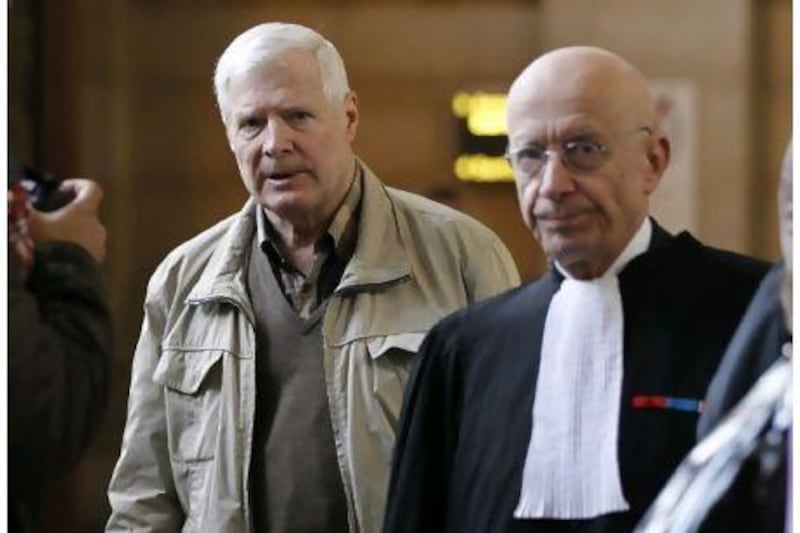Fortified by his belief that justice may be about to be done, a 73-year-old retired accountant stared across a Parisian courtroom yesterday at another elderly man he is accused of kidnapping.
But André Bamberski was not, at least not yesterday, the man on trial. It was the object of his gaze, a German doctor named Dieter Krombach, who occupied the role of defendant, accused of the murder, three decades ago, of Mr Bamberski's 14-year-old daughter Kalinka.
The start of the case in Paris's Palais de Justice was the latest development in a story with twists as strange as fiction, one that has gripped France and Germany and caused conflict between the judicial systems of the two countries.
Dr Krombach, 75, was brought to trial because of the doggedness of a bereaved father determined that the man he has long suspected of killing his "beautiful, adorable" child should not escape the consequences.
Kalinka died in July 1982 during a holiday with her mother, who after her divorce from Mr Bamberski had married the German cardiologist at Lindau, close to Lake Constance, Bavaria.
Dr Krombach said he had injected his stepdaughter with iron compound to help her tan more quickly and maintained that her death was accidental.
He later changed his account, saying he had treated her for previously undiagnosed anaemia.
Mr Bamberski, from Toulouse in south-western France, concluded that the doctor had drugged, raped and killed his daughter.
A post-mortem examination found injection marks on Kalinka's arms, right leg and thorax. There was also evidence of injuries to her reproductive organs. But the German authorities considered there were no suspicious circumstances.
Three years after the girl's death, Mr Bamberski obtained a court order for a new autopsy. But when Kalinka's corpse was exhumed, intimate parts of the body were found to have been removed.
Dr Krombach was tried in his absence in France and sentenced to 15 years' imprisonment for manslaughter. Rape was not proved. Germany resisted attempts to have him extradited but in 1997, two years after the French court case, he was convicted of sexually assaulting a 16-year-old patient whom he had anaesthetised during surgery.
He was given a suspended sentence on that conviction.
Other women claimed they, too, had been molested in his care.
The European Court of Human Rights ruled in 2001 that the manslaughter conviction in France was unsound. But Mr Bamberski continued to fight for what he saw as justice for Kalinka.
Dr Krombach returned to medical work and was jailed for 28 months in Germany in 2007 for practising illegally.
Mr Bamberski was not satisfied by punishments imposed for unrelated matters. He frequently travelled to Bavaria to check on Dr Krombach's whereabouts, prompting the doctor to move more than once.
And in October 2009, Dr Krombach was kidnapped from outside his home, driven across the border and left bound and gagged near the court building in the eastern French city of Mulhouse.
Mr Bamberski publicly admitted that he had given his blessing to the abduction plan after being approached by a sympathetic Kosovan stranger.
The father's side of the story was told in an autobiography, Pour Que Justice Te Soit Rendue (So That You See Justice Done). "At last I know that the purpose of my life will be fulfilled," he told the BBC at the time of publication. "Dieter Krombach will be judged for murder in a criminal court, and I will be there to see it happen."
He said he took no part in the abduction and regretted that it had to take place. "But I was facing a complete dead end … I had to do something."
Mr Bamberski will stand trial later this year, with two other men, accused of kidnapping.
After the abduction, which caused anger in Germany, lawyers acting for the doctor sought in vain to have him freed.
They also tried unsuccessfully to have Mr Bamberski's book banned on the grounds that it made a mockery of the presumption of innocence.
But French judges ruled that despite the unconventional manner of his capture, Dr Krombach could stand trial.
They cited precedents set by cases involving the international terrorist known as Carlos the Jackal and the former Nazi chief Klaus Barbie, both prosecuted in France after having been seized abroad.
Dr Krombach, who arrived at court on crutches yesterday and did not return his accuser's gaze, continues to protest his innocence.
His lawyers say it is outrageous that having been cleared in Germany, he was then kidnapped and illegally transferred to France.
"Dieter Krombach is not Klaus Barbie," said Yves Levano, a member of the defence team that now seeks to have the case thrown out.
The trial, due to continue into next month, has split the Krombach family.
The doctor's own daughter arrived at the court in Paris yesterday declaring her certainty of his innocence.
His ex-wife, Kalinka's mother - they, too, divorced, in 1989 - previously stood by him, but is now less sure and took her place yesterday with Mr Bamberski among the civil parties.







